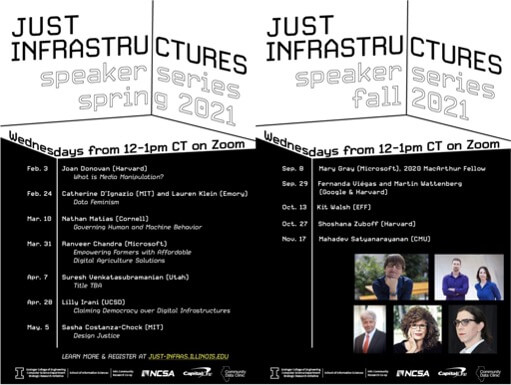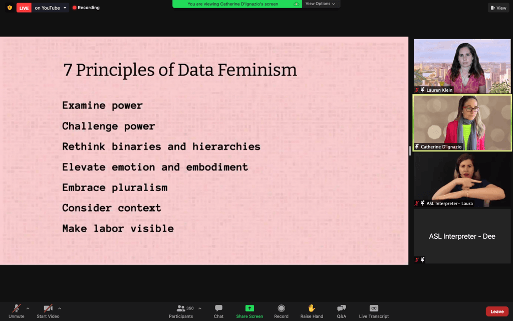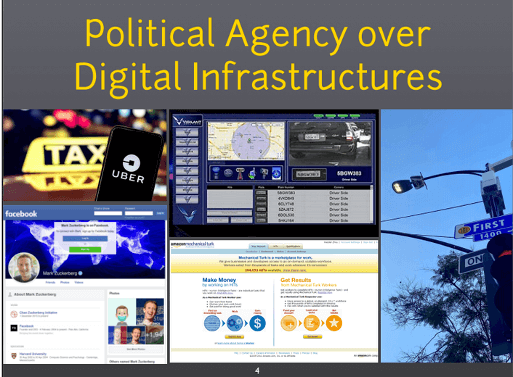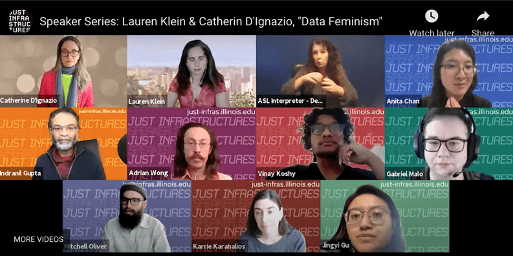Enacting Just Infrastructures as a Design Principle
Adrian Wong, Gabriel Malo, Jingyi GuOctober 3, 2022 | Report-Backs
In 2021, The Center for Just Infrastructures at the University of Illinois at Urbana-Champaign hosted the Just Infrastructures speaker series, with the goal of interrogating the complex interactions between people, data, systems, and algorithms. The interdisciplinary organizers of this event – Anita Say Chan, Karrie Karahalios, and Indranil Gupta, spanning Science and Technology Studies (STS), Communications, and Computer Science – brought focus to critical debates around AI, social justice, and the challenge of ensuring “Just Infrastructures,” a concept currently resonating across the disciplines of computer science, information science, media studies, and indeed, science and technology studies. The series’s sponsors included Grainger College of Engineering Strategic Research Initiative, the School of Information Sciences, the Department of Computer Science, Capital One, the National Center for Supercomputing Applications, and the Community Data Clinic. An audience of several hundred regularly included local residents, community leaders, and scholars at all points of their life processes, hailing from the university’s territory and hinterlands to across the country and around the globe.[1]

Figure 1: Just Infrastructures Speaker Series posters
Following the series’s mission to “study, critique, and create new infrastructure approaches, systems, and algorithm processes,” speakers discussed problems and possible solutions to non-transparent, hard-to-govern, and too-frequently-damaging aspects of digital systems. In opening the series, Joan Donovan invoked Susan Leigh Star’s beloved call to the study of boring things, since to critically examine informational systems is to study (boring) infrastructures themselves. Outlining how media manipulation is produced by the conditions of networked media ecosystems, Donovan set the stage for the Just Infrastructures series by showing how questions of infrastructure, control, and invisible influence manifest every day.
Each speaker brought unique conceptualizations for broad questions of critical infrastructure studies into conversation with specific research agendas. While infrastructure too-often suggests objects and connectivity, many speakers urged us to ask “who” questions: who designs? Who controls? Who is targeted? Highlighting Mimi Onuoha’s “The Library of Missing Datasets” (2016), which depicts the absence of datasets that a reasonable person might expect to be collected, Catherine D’Ignazio and Lauren Klein argue that “who questions” relate directly to examining imbalances of power whose intersection leads certain data to be gathered, made accessible, or established as the basis for research agendas, while invisibilizing others.

Figure 2: Catherine D’Ignazio and Lauren Klein introducing the “Seven Principles of Data Feminism” with ASL interpretation from UIUC’s Disabilities Resources and Educational Services (DRES) Office. February 24, 2021.
Datasets are only one of many aspects affected. When their relentless need to categorize bumps up against the infinite variance and creativity of human forms and practices, infrastructures target individuals for “anomalies.” Detailed by Sasha Costanza-Chock in Design Justice, these breaking points manifest as “dysaffordances,” where users are required to misidentify themselves to access certain functions of infrastructure. Alternatively, they may appear as false assumptions made by designers of digital contact tracing apps – that everyone can access healthcare, work from home, or be cared for by others – as Mary L. Gray poignantly illustrated.
Stark imbalances of power and problematic design motivate us to look for solutions or better ways to govern human and machine behavior. Speakers shared insights into numerous pathways to check unwanted effects of digital, networked, or algorithmically empowered infrastructures: conducting independent algorithm audits (Kit Walsh), citizen science algorithm experiments (Nathan Matias), re-working critical algorithm studies from the inside-out (Suresh Venkatasubramanian), or collaborating with local community groups to bring digital infrastructures under democratic institutions (Lilly Irani). Alternatively, such infrastructures and technologies can be applied to solve crises of food production or data analysis, assist in everyday tasks, or create new artistic visualizations, as evidenced in the work of Mahadev Satyanarayanan, Ranveer Chandra, Fernanda Viégas, and Martin Wattenberg.

Figure 3: Lilly Irani shares collaborative efforts to claim democracy over digital infrastructures. April 28, 2021.
The Just Infrastructures Speaker Series created a community of collaborative knowledge co-production by inspiring the imagination of scholars from different fields that rarely intersect, but shared a plurality of approaches to center justice in data practice and infrastructure system design. Through these open and accessible scapes for audiences to engage scholars and each other, we co-produced questions and insights to speculate ethical, equitable, and public-engaged approaches to critical research and education on data and infrastructures. As emerging scholars and practitioners in critical data thinking and infrastructuring, students who participated in this event contributed their voices to envision communally a more inclusive digital future.
The virtual and in-person lecture series took seriously the mission of Just Infrastructures in design and implementation. Organizers collaborated with the university’s Disability Resources & Educational Services to design extensive accessibility support and built a diverse, interdisciplinary moderation and safety team, comprising graduate students training in STS, Human Computer Interaction (HCI), feminist, trans, decolonial, and global critical theories. In light of the propensity for trolls and “surprise guests” to disproportionately target events featuring feminist and critical race scholars, this team ensured–with love and care–that no one disrupted the event or attacked our speakers, audience, or organizers. As COVID restrictions were relaxed at the university, the organizers produced open gatherings, pop-up theaters where anyone could attend and contribute. The intentionality of the series’ design, in keeping with the Center’s vision, facilitated conversations across socio-political, techno-economic, and disciplinary boundaries, and also the divide between academia and the interested public.

Figure 4: Just Infrastructures Speaker Series organizers Karrie Karahalios, Anita Say Chan, and Indranil Gupta introducing speaker Shoshana Zuboff, who discussed new codependencies of surveillance and capitalism. October 27, 2021.
Collaborative efforts of the team crossed multiple media in order to enact our protocol for safety and open engagement, including collectively contributing to the “run of show” and “moderators’ manual” documents, and hosting before- and post-event team meetings for planning and debriefing. In using multiple backchannels of communication to simultaneously care for presenters, audience, and ourselves, we infused a university event with a new form of organizational reflexivity toward–we hope–accessible, safe, and emancipatory ends. Talks were captioned and accompanied by live ASL translation. The live feed and recordings were made publicly available, ensuring that they were and would remain accessible to a broader audience. In order to inspire a different form of inquiry, the organizers allowed in-person and virtual participants to submit questions as they arose throughout the presentation; those questions were moderated and presented to the speakers. By enacting just infrastructures as a design principle, each event’s post-presentation Q&A inspired academic, applied, and activist imaginations for how equitable infrastructures could be realizable.

Figure 5: Just Infrastructures Series speakers Catherine D’Ignazio, Lauren Klein, and DRES ASL Interpreter with faculty and graduate student organizers, Anita Say Chan, Indranil Gupta, Adrian Wong, Vinay Koshy, Gabriel Malo, Mitchell Oliver, Karrie Karahalios, and Jingyi Gu (top left to bottom right). February 24, 2021.
With live streaming and live tweeting, the speaker series also engaged a broader communality that shares care and desire for justice in computing and digital technologies and their real-world implications. Through outreach beyond the traditional boundaries of academia, individuals of the scholarly hinterlands were able to enrich the breadth and depth of conversations with their profound experiences and situated knowledge as community-based organizational leaders and educators. The series, from speaker selection to event design, was co-created by the organizers in conversation with community groups, in addition to some 30 departments and organizations across the university. In this sense, it bridged some of the deepest chasms of scholarly work, such as the town and gown divide and those reinforced by the disciplines. Because of the plurality of both organization and engagement, the Just Infrastructures Speaker Series both presents rigorous scholarly conversations about the relationships between people and computing systems in and beyond STS, and showcases the multifacets of the social life of such research entangled in civic participation, the implementation of technologies in public and private sectors, law and policy making. To access more information about the Just Infrastructure Speaker Series and the recordings of all speaker series events, go to: https://just-infras.illinois.edu/.
[1] We recognize and acknowledge that this event took place on the lands of the Peoria, Kaskaskia, Piankashaw, Wea, Miami, Mascoutin, Odawa, Sauk, Mesquaki, Kickapoo, Potawatomi, Ojibwe, and Chickasaw Nations. These lands were the traditional territory of these Native Nations prior to their forced removal; these lands continue to carry the stories of these Nations and their struggles for survival and identity.
As a land-grant institution, the University of Illinois has a particular responsibility to acknowledge the peoples of these lands, as well as the histories of dispossession that have allowed for the growth of this institution for the past 150 years. We are also obligated to reflect on and actively address these histories and the role that this university has played in shaping them. This acknowledgement and the centering of Native peoples is a start as we move forward for the next 150 years.
______________________________________________________
Adrian Wong (he/him) is a Ph.D. student in the Institute of Communications Research, University of Illinois Urbana-Champaign. He inquires into the politics and implications of digital transformation initiatives, especially those implemented by public-private partnerships in the Global South. Previously a Presidential Scholar at the University of Southern California where he performed viola with Midori Goto’s Community Outreach Quartet, he enjoys playing and recording music with his brother, Julian, in the duo [Empty Cloud]. Adrian grew up meditating with his father, Karming, who had been a Buddhist monk for ten years, and strives to bring conscious care to his life, work, and relations.
Gabriel Malo is a Ph.D. Candidate in the Institute of Communications Research in the College of Media, with an MSLIS from the School of Information Sciences, both at the University of Illinois at Urbana-Champaign. His research focuses on alt-right disinformation networks, cultures, and identities.
Jingyi Gu is a Ph.D. candidate in Media and Communications at the Institute of Communications Research, University of Illinois Urbana-Champaign. Her main research interests include identity, community, governance, resistance in platform economies and digital cultures. As a critical digital studies scholar, Jingyi is also interested in the politics of algorithms and data on a global scale. She is currently working on her doctoral dissertation exploring gender and sexuality in Chinese live streaming through the lenses of mediated intimacy and digital labor.
Published: 10/03/2022
